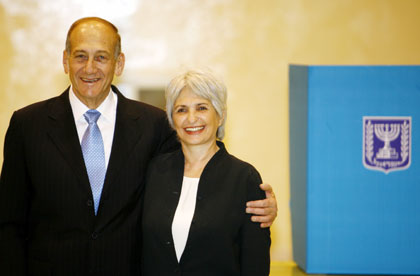JERUSALEM - Interim Prime Minister Ehud Olmert claimed victory on
Wednesday in Israel's election, saying he would pursue a plan to give up parts
of the West Bank and impose a border on the Palestinians if peacemaking stays
frozen.
"Today Israeli democracy has spoken clearly. Israel wants Kadima," Olmert
said in a speech at the centrist party's election headquarters after exit polls
in Tuesday's vote gave it 29-32 seats in the 120-member parliament.

Israeli interim Prime
Minister Ehud Olmert (L) embraces his wife Aliza after voting in Jerusalem
on March 28, 2006. Israelis began voting in an election on Tuesday that
interim Prime Minister Ehud Olmert has called a referendum on his plan to
uproot remote settlements in the West Bank if peacemaking with the
Palestinians stays frozen. [Reuters] |
The figures were less than expected but still a first-place finish putting
Kadima in position to form a governing coalition.
In the absence of progress toward peace, Olmert aims to set Israel's final
frontier by 2010 by removing isolated settlements in the occupied West Bank
while expanding bigger blocs there.
Palestinians say such go-it-alone moves, sweeping measures that would uproot
tens of thousands of settlers while tracing a border along a fortified barrier
Israel is building inside the West Bank, would deny them a viable state.
Olmert, appealing in his speech to Palestinian President Mahmoud Abbas, said
Jews had aspired for thousands of years to create a homeland throughout the Land
of Israel, biblical territory that includes the West Bank.
"But acknowledging reality and circumstances, we are ready to compromise, to
give up parts of the beloved Land of Israel ... and evacuate, with great pain,
Jews living there, to create the conditions that will enable you to fulfill your
dream and live alongside us," Olmert said.
If the Palestinians did not move toward peace, he said, "Israel will take its
destiny in hand" and set permanent borders after lobbying the United States and
other countries for support.
The exit polls forecast center-left Labour, a likely partner for the recently
formed Kadima, would receive 20-22 seats and the far-right Yisrael Beitenu party
13-14.
Near-final results should be available early on Wednesday.
NETANYAHU SETBACK
In a sharp setback for former Prime Minister Benjamin Netanyahu, his
right-wing Likud was projected to get only about 12 seats.
Netanyahu pledged to stay on as Likud chief, a post he regained only three
months ago after then-Prime Minister Ariel Sharon quit the party amid an
internal revolt over Israel's Gaza pullout. Sharon founded Kadima before
suffering a stroke in January that sent him into a coma.
Olmert's unilateral approach appeals to many Israelis worn down by a
five-year-old Palestinian uprising and concerned by the rise to power of Hamas
in the West Bank and the Gaza Strip after the Islamist militant group won
elections in January.
But Kadima's projected showing, weaker than the 44 seats opinion polls had
once predicted it would win, signaled that Olmert, a veteran politician short on
charisma, could have trouble sustaining support for his dramatic plan.
Kadima was also expected to seek a coalition with a clutch of small parties
ranging from ultra-Orthodox Jewish factions to a pensioners' rights group.
"But I don't think we'll see a coalition form quickly. Bargaining will be
difficult," predicted Ephraim Inbar, director of the Begin-Sadat Center for
Strategic Studies at Israel's Bar-Ilan University.
HAMAS GOVERNMENT
Israelis voted on the day the Palestinian parliament approved a government
formed by Hamas, a group committed by its charter to Israel's destruction.
"While the election is being held in the Israeli entity, the flags of the
Hamas government are being raised," Hamas's Prime Minister-designate Ismail
Haniyeh told a rally in Gaza.
Olmert has ruled out any dealings with Hamas until the group recognizes
Israel, disarms and accepts interim peace deals.
Some 60,000 West Bank settlers could be affected by Olmert's plan, far more
than the 8,500 removed from Gaza. Around 240,000 Israelis live among 2.4 million
Palestinians in the West Bank, territory Israel captured in the 1967 Middle East
war.
The trauma for settlers of any withdrawal from land they see as a biblical
birthright could dwarf that of last year's Gaza withdrawal which Sharon
championed in a reversal of policy.
"What we have seen is a defeat for the people of Israel," said Miriam
Goldfisher, 47, a West Bank settler.
The World Court has ruled that all of the 145 settlements Israel has built on
occupied territory are illegal. Israel disputes this.
Israeli right-wingers, who appeared to have crowned a new leader in Yisrael
Beitenu's Moldovan-born Avigdor Lieberman, a settler and former Netanyahu aide,
say removing more settlements would reward and encourage Palestinian violence.
President Moshe Katsav is expected to assign the task of putting together a
government after consultations with parties on Sunday. Usually, the job goes to
the leader of the leading party in the elections, who has up to 42 days to
complete it.